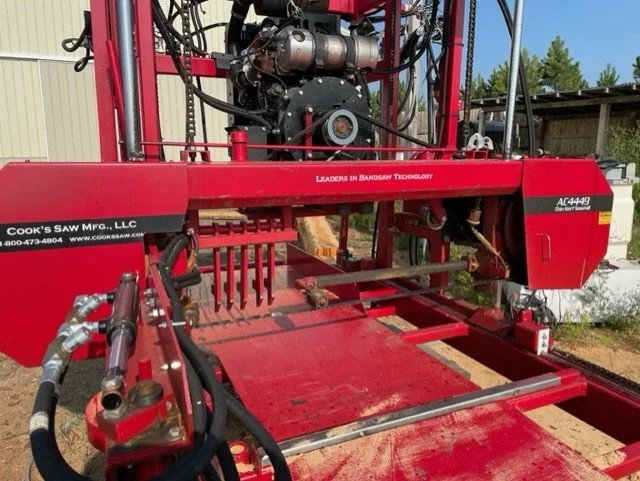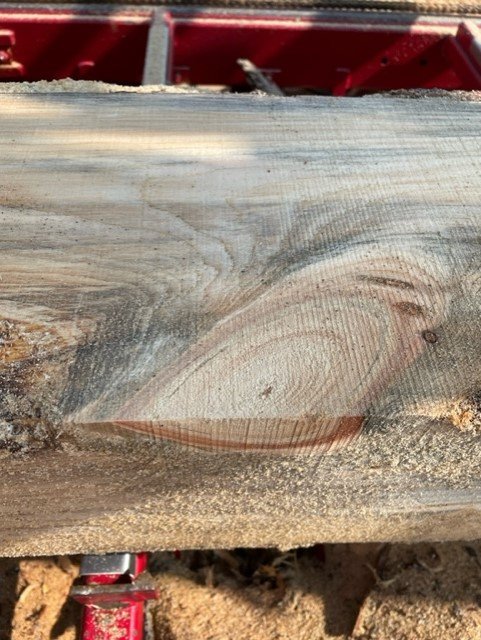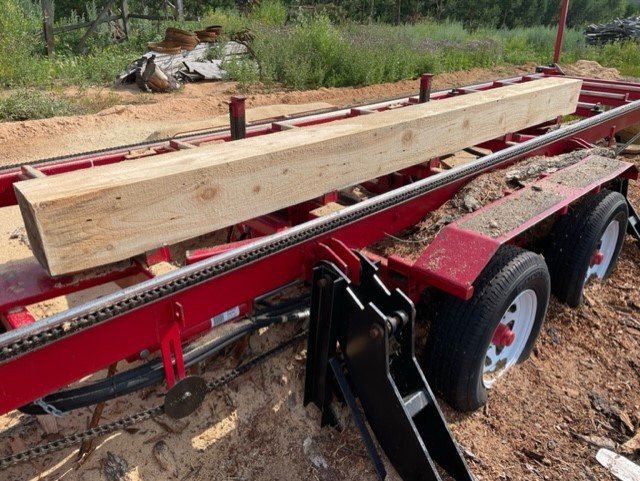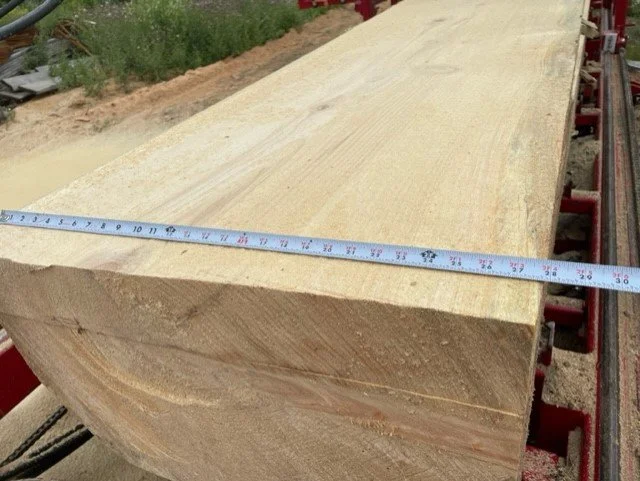Product Review: KASCO WoodMaxx Saw Blade
Over the years, I have used saw blades from various manufacturers. Through trial and error, I have found the type of saw blades that work best with my mill. However, I have never used a saw blade from KASCO before, so when the opportunity arose, I jumped on it. As a sawyer, I have learned it never hurts to try something new, especially if it could possibly help the milling process go smoothly and increase production.
Here is my honest firsthand experience with KASCO WoodMaxx saw blades.
PACKAGING:
First of all, the packaging may seem insignificant, however, it is very important to keep separation between the teeth of the saw blade. If the teeth or blades are not properly separated, they can rub or even potentially affect the “set” of the teeth. This can give you sawing problems right out of the box, even with a brand-new blade. Also, this is the first time I have noticed a blade company use the “Armor Wrap” in the box, which helps to prevent any rusting of the blades in the box. After opening the box, I measured the tooth spacing to ensure it was what I had ordered. This particular blade has a 7/8 tooth spacing. In other words, there is a tooth every 7/8 of an inch on the saw blade.
Packaging in which the KASCO WoodMaxx saw blade arrived.
KASCO used "Armor Wrap" to help prevent the blades from moving around.
Verifying the right tooth spacing was sent.
The video above shows that the saw blade I received was 1.5’’ wide; 7/8 (tooth spacing), and a thickness of .050. I compare this to the Wood-Mizer 747 and Kenne-Saw blades. I mention the Wood-Mizer and the Kenne-Saw as these two particular blades have performed on my particular mill very well. By comparison, when I use the Wood-Mizer blade in the .055 thickness, they tend to break pre-maturely. The Kenne-Saw blades however, in the .055 thickness, have yet to break.
SAW BLADE IN ACTION:
I’m using the KASCO WoodMaxx saw blade on a Cooks AC 4449. This particular sawmill has a 48’’ width capability with 19’' band wheels. The mill is powered by a 49HP Perkins Diesel.
The second picture shows that I am verifying the tracking of the saw blade. This is very important when putting on any blade, especially from a different manufacturer. The photo shows that the blade is barely in front of the back edge of the guide roller. I was able to tension the blade just a bit more to get about 1/8’’ inch of a space. Sometimes certain blades will track differently enough to where you have to adjust the band wheels themselves. On that note, I was very pleased that these blades tracked similar to what I have been running so I didn’t have to adjust the band wheels.
The log I’m milling is a smaller white pine log. As with any log, if there are no knots it’s fairly easy to get nice straight boards, beams, etc. Throw a few knots in the mix and sometimes it will throw the blade for a ride. This little log had just enough knots, in my opinion, to see how the blade would transition through them. Overall, I was impressed. The saw blade cut right through the knots with literally no deviation, just as one would hope for. Let’s face it: anyone that runs a small bandsaw machine knows that knots can pose a problem!
Using the blade on the Cooks AC 4449 sawmill.
Verifying the tracking of the saw blade.
Milling a small white pine log.
This shows how well the KASCO Wood Maxx saw blade handled the knot in the white pine.
The video above shows the first two cuts on the blade. It cuts a nice smooth finish and handles the knots without a problem. (Note to self: turn off the mill when talking!)
FINISHED WHITE PINE:
As you can see in the photos below, I was able to produce a finished 8x8x10’ white pine beam. You can also see that with a blade that cuts true, it’s easier to cut nice square cants. I have used blades in the past that have actually put a crown in the cant. You can’t cut a cant if the blade is not cutting true! In total, I did around 270 board feet. The KASCO WoodMaxx saw blade was still cutting sharp and true.
Finished 8x8x10’ white pine beam.
Nice square cants.
This finished 8x8x10’ white pine cant was 5 of the 8x8’s so far totaling around 270 board feet.
HARDWOOD TEST:
I wanted to cut some hardwood as well to see how the KASCO WoodMaxx saw blade handled. Granted, I could have cut the white oak log first, but I thought it would be a better test on the blade after cutting 200 plus board feet. I cut the white oak without any issues. The blade was still cutting straight with a nice smooth finish.
I typically cut around 300 board feet, then change the blade out. Even if the blade is still cutting nice, I prefer to change them out as they are easier to re-sharpen and overall, you will get longer life out of your blade. For this particular trial, I was pushing the saw blade farther to see if it would break. (I have had similar blades break in this thickness of a blade around 300-400 board feet).
After processing 20 1x6x8’s of the white oak, it was still cutting fine, so I decided to throw on a larger white pine log. Sometimes when I cut logs around 30’’ diameter, the blade tends to weave. Since I would’ve normally pulled this blade off for re-sharpening, I expected some deviation in the cut. This cut was around 28’’ wide and the blade had little to no deviation. The surface of the slab was still nice and smooth.
After cutting 70 2x4’s; I finally changed the blade out. This put the total board feet on this blade right around 750! Again, I want to stress this was a test on the blade. I have had numerous blades break on their first use around the 300-400 board foot mark. I recognize it’s not normal for any blade to break its first use around 300 board feet. This has been part of the reason for trying various manufacturers of blades to see if it’s a blade issue or an issue with my machine.
Overall, if I run thinner blades, .040 for example, I rarely have blade breakage. I really like how the thicker .050 or even .055 cut straighter (in my opinion) and tend to run them more. This is where I have run into more blade breakage in the thicker blades. Although this KASCO WoodMaxx saw blade was still cutting relatively fine, I don’t enjoy having the mill work harder than it has to, so I decided to pull for sharpening.
White oak log.
Cutting nice and straight.
Cutting a larger white pine log at 28 inches diameter with little to no deviation on the blade.
8x8x10s
After cutting these true 2x4x8 pines, I finally changed the saw blade out. This put the total board feet around 750!
SUMMARY:
For having trialed the KASCO WoodMaxx saw blades; they exceeded my expectations. I say this because after cutting over 500 board feet of mixed pine and hardwood, they continued to cut smooth and straight. Also, there was no blade breakage, which on my particular machine I can say that is not always the case.
In order to find out the overall longevity of the WoodMaxx saw blades, I will sharpen them and keep using them. I will also be ordering more of these saw blades from KASCO and continue to run them.














